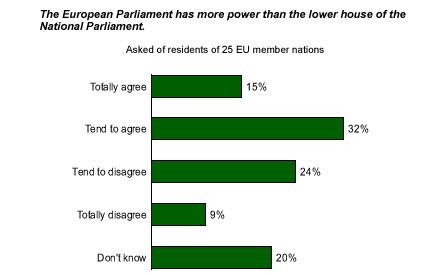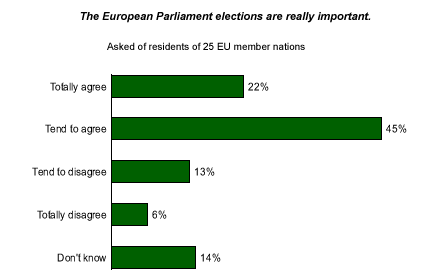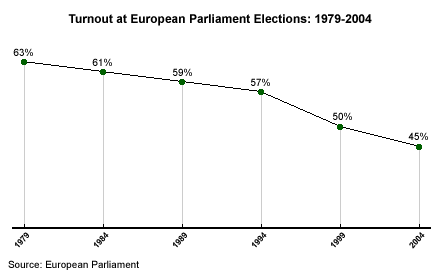On June 10-13, more than 150 million Europeans took part in one of the largest Western democratic elections in history -- the election of the parliament for the European Union (EU). About 50 million more votes were cast in the European election than in the 2000 presidential election in the United States.
The citizens of the EU's 25 member countries have chosen 732 delegates to represent them in the European Parliament (EP) -- a legislative body that is regulating more and more details of their everyday lives. According to the Eurobarometer, a survey conducted by Gallup Europe before the recent elections*, the European public is acutely aware of the relevance of the EP. In 18 out of the 25 countries (the largest EU member nations are the exception), the majority of citizens agree with the statement that the European Parliament has more power than the lower house of their respective national parliaments.

While the citizens of each country elected national candidates, the candidates theoretically do not represent nations, but instead group together to form European party platforms. The center-right conservative European Peoples' Party (EPP) remains the largest party in the EP, with 274 delegates. The European Socialist Party (ESP) is a remote second with 198 delegates.
Parties and voters traditionally use the EP elections to give and receive feedback on the internal politics in each member state, and the current election delivered a very negative message for the ruling parties in most countries. In many countries, smaller, far-right, or euro-skeptic (skeptical of participation in the EU) parties have gained ground at the expense of more well-established parties.
In the countries in which the governments have supported the Iraq war, the citizens voted against the incumbent governments in great numbers. But the incumbent governments also fared badly in Germany and France, two countries that opposed the conflict in Iraq. The governing German Social Democrats have suffered their largest defeat since World War II. In the United Kingdom, as well as in Sweden and other countries, anti-EU parties gained seats in the new European Parliament. The United Kingdom Independence Party, which advocates complete withdrawal of the UK from the EU, secured third place with 17% of the vote.
European Public Opinion on the EP
Despite the political gains of EU opponents from some countries, Eurobarometer findings reveal that in virtually all of the EU's member states, residents' level of trust in the EU is higher than in their own national governments; the opposite is true only in the Nordic EU countries (Sweden, Finland, and Denmark), in Austria and Luxembourg, and in the new member states of Estonia and Cyprus.
In each country, high proportions of survey respondents (60% or more) agreed with the statement, "the European Parliament elections are really important." Even 52% of the British, who tend to be the most reserved about EU-related issues, agree theoretically with this statement, according to the Eurobarometer survey.

Nevertheless, turnout for this month's election was relatively low. Voter apathy is a growing problem for those concerned about the representativeness of the European Parliament; since the first EP elections in 1979, turnout has fallen from 63% to 45% this year.

Contrary to what happened after previous enlargements of the EU, the citizens in the new member countries turned out in relatively low numbers, which resulted in a lower overall turnout. While the participation rate in the old member countries fell only marginally behind the 1999 figure, only about a quarter (26%) of the new citizens of the EU bothered to vote. The voters in the Czech Republic, Poland, and Hungary used the ballot to punish their governments, who all supported the Iraq war.
*The standard Eurobarometer was established in 1970 as a tool to track the evolution of the citizen opinion of the European integration. Each survey consists of approximately 1,000 face-to-face interviews per Member State (except Germany: 2,000, Luxembourg: 600, United Kingdom 1,300 including 300 in Northern Ireland). Conducted between 2 and 5 times per year, with reports published twice yearly. The fieldwork is coordinated by EORG. First wave of Candidate Countries Eurobarometer was carried out in October 2001 in all the 13 countries applying for membership. One thousand face-to-face interviews are conducted in each country, except for Cyprus and Malta, where the number of interviews conducted are 500 each. The fieldwork is coordinated by Gallup Hungary, and the reports and analysis are written by Gallup based on a contract with the European Commission. The fieldwork for the last wave reported here was conducted in March-April of 2004 and more information about this report can be found here.
